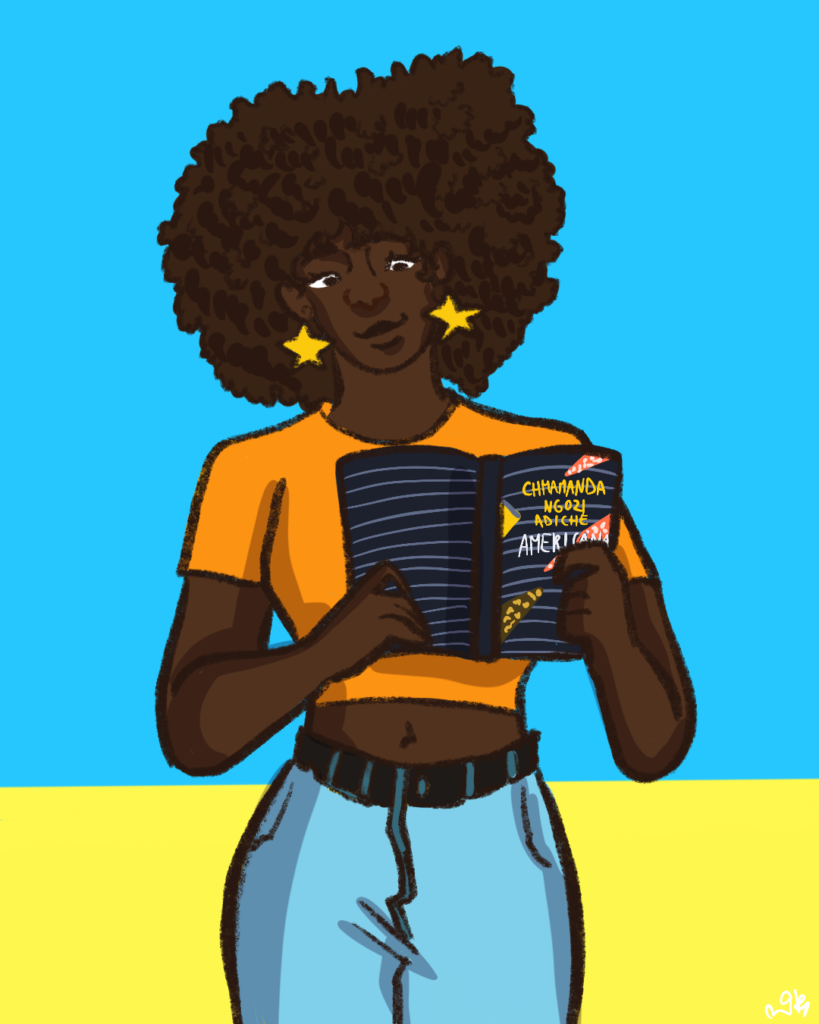By Carla Gilotti
Edited by Maeve Bouchez
When a teacher asks you to read a book, your first urge is to pray it be short or at least easy to read. Not that I mind reading. On the contrary, I find that reading a book is not only a good way to spend time but can also be a great topic of conversation (even the laziest reader has happened to recommend or simply comment on a book they liked).
But reading a long, or sometimes complex, book, requires a certain amount of free time, and if I have to take into account school, homework, and extracurricular activities (that I try to cultivate more or less seriously), then the little free time I had turns out to be very little, a luxury almost. Therefore, it can be very “hard” to read a book for school, especially when, rather than having chosen to do so, you’re forced to.
When I had “Americanah” by Chimamanda Ngozi Adichie in my hands, I shuddered… Almost 600 pages! And in very small print too! Clearly my first request, that of it being short, was not answered.

At first glance, neither the book’s title nor the author aroused any curiosity in me whatsoever. However, once the book started, the text flowed pleasantly. It was easy for me to get used to the author’s style and even easier to become attached to the protagonist, Ifemelu’s, story.
In the beginning, I found it difficult to accept Ifemelu’s character (which in the end I found quite original), not only because this woman comes from a reality that is unknown to me (like the author, Ifemelu is Nigerian), but also because of the way she experiences the profound contradictions of today’s society, particularly American society.
The situations “Americanah” describes evoke extreme themes, many of which appear exotic to a reader living in Luxembourg. Despite all of these differences, Ifemelu’s sincerity gradually entices the reader and makes it easy to identify with her
Regardless of the book’s length, it is easy to read. It’s a brilliant study on racial discrimination in the United States, a reality that is sometimes little-known, often misunderstood (even by Americans themselves) and certainly much more complex than we think.
Moreover, racial discrimination, although treated seriously and in depth, gradually becomes the key to a more universal debate on diversity (whether it be social, economic, gender-related, geographical, or simply cultural).
Ifemelu’s thoughts lead us through the chaos of stereotypes and common prejudices, but her reflections, which started out technical and political, progressively become human, sensible, and at times, even moving.
As a result, Ifemelu’s story, which may appear ordinary, or even trivial in some respects, gradually develops in an interesting and profound way. And once I got into it, I felt compelled to get to the end of the 600 pages; it would have been impossible for me to stop reading and not know what destiny awaited Ifemelu’s hopes, ambitions, and social condition.
However, after following Ifemelu so closely, her story’s ending was not spectacular. In fact, it may come off as banal, and I myself cannot hide a bit of disappointment. But regardless of this detail, I enjoyed reading “Americanah,” and I highly recommend it even to those who are unlucky (or lucky?) to have it as required reading for school.
I think “Americanah” is a good book to read. The style is modern. The content is topical and handled in a different way than what we might be used to. It’s humorous at times. Even here in Luxembourg, I am convinced that some of us will be able to relate to it.
